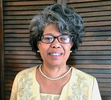Robin R. Foster's Blog, page 5
October 30, 2023
I Learned about the National Society United States Daughters of 1812 and More on Boundaries

On Saturday, October 28, 2023, we were there selling books next to Laura C. Edwards. She is the President of the NC State Society. I got to learn that there is the Daughters of 1812. Their website is: NC Daughters 1812
"The purpose of the National Society is to promote patriotism, to preserve and increase knowledge of the history of the American people by preserving documents and relics, marking historic spots, recording family histories and traditions, celebrating patriotic anniversaries, teaching and emphasizing heroic deeds of civil, military, and naval life of those who molded our government between the close of the American Revolution and the close of the War of 1812, to urge Congress to compile and publish authentic records of men in civil, military, and naval service for 1784 to 1815 inclusive; and to maintain at National Headquarters a museum and library on the memorabilia of the 1784-1815 period." - NC Daughters 1812
They have North Carolina Society Chapters. The chapters are:
Cherokee Chief Junaluska Snap Dragon Captain Johnston BlakeleyEligible members:

I also discovered that Laura has provided presentations on a variety of topics. If your group or society would like to have her speak, just email her at: Ledwards6@nc.rr.com
I was really interested in a topic I found very interesting. She got a chance to discuss boundaries with me. Most of you know how I stress knowing the boundaries where you ancestor lived. Well get this: Laura explained how sometimes our ancestors did not know the boundaries. Neither did the census taker, nor the person who was responsible for surveying the land. Sometimes the surveyor got the property line wrong. It was different than the map.
Your ancestor could have brought property in Anson County, North Carolina, but he actually was in Cherokee County, South Carolina due to the way the surveyor measured the map and land. This would be important to know.
October 23, 2023
Works Project Administration Slave Narratives: Genealogy
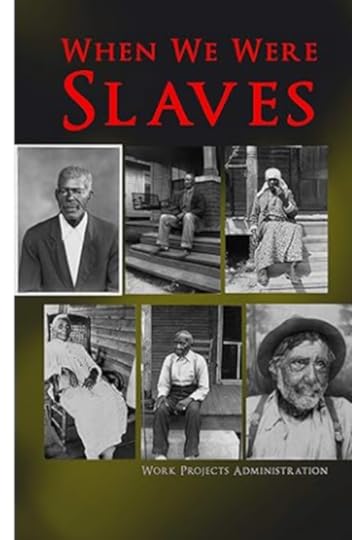
If you're tracing a formerly enslaved person, make sure you go to get this e-book for all the slave narratives: "When We Were Slaves." It is 9226 pages. It covers the areas of:
Alabama Arkansas Florida Georgia Indiana Kansas Kentucky Maryland Mississippi Missouri North Carolina Ohio Oklahoma South Carolina Tennessee Texas VirginiaThey do not have Louisiana:
The Louisiana Works Progress Administration (LWPA) Slave Narrative collection
This is what "When We Were Slaves" looks like when you buy it:
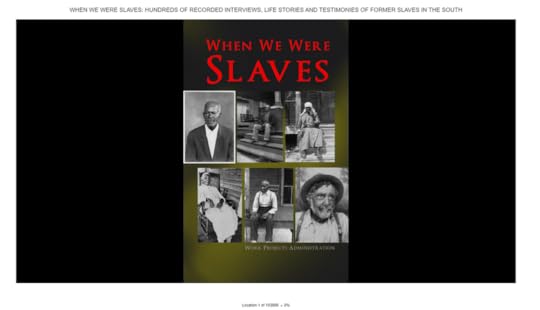
You can look up to find your ancestor or look at the place that your ancestor lived. You might find relatives, other family, someone who knew something about your ancestor. Look at all the slave narratives for that area. Compare to see what you can find.
Look up on the:
1870 Census 1880 Census Will or probate to see if you can find the enslaver Local newspaper Historical societies that have church records with the enslaver and the enslaved Deed Bill of sale Death certificate FindAGrave memorialYou can also look up other resources on the FamilySearch's Research Wiki.
I looked up "Charleston, South Carolina." The results brought up seventeen places.
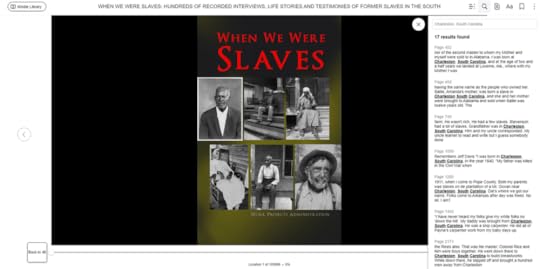
I looked at John Bowdry who was born in 1865. He was seventy-five. His grandfather was in Charleston, South Carolina, but John was from Clarendon, Arkansas (page 740).
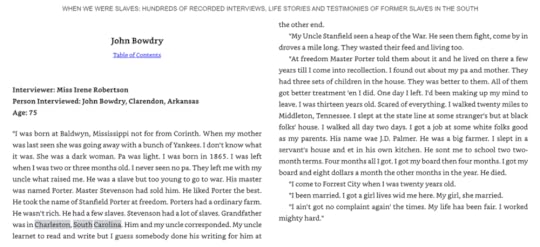
Former Female Enslaved’s Father and Her Marriage
Henry Coleman is in Spartanburg County, South Carolina (page 6810). Here is part of his narrative:
“Atter de war, come up to Shelton and got to de ‘o’ Hamilton place. I wuz grown den. I seed a young girl dar what dey caalled ‘Evvie.’ Her paw, he had b’longed to de Chicks, so dats she wuz, Evvie Chick. Dar she sets in dat room by de fire. Now us got ‘leven chilluns. …dey wouldn’t have no sassy chilluns like see here in Carlisle.
Evvie, what year wuz it we got married? Yes, dat’s right. It wuz de year of de ‘shake’.”
Evvie: “My paw, Rufus Chick, lived on the Union side of Broad River, the latter days of his life. …The body was perfectly petrified. This was my paw’s body. The canal authorities sent the body to a museum in Detroit. It was January 11, 1877 when my father got drowned.”
Next, I went to find some historical records.
Evie's death certificate:
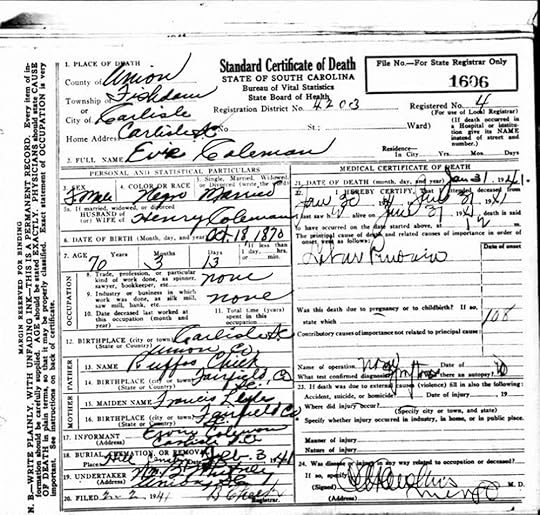
Then, I found Henry's death certificate:
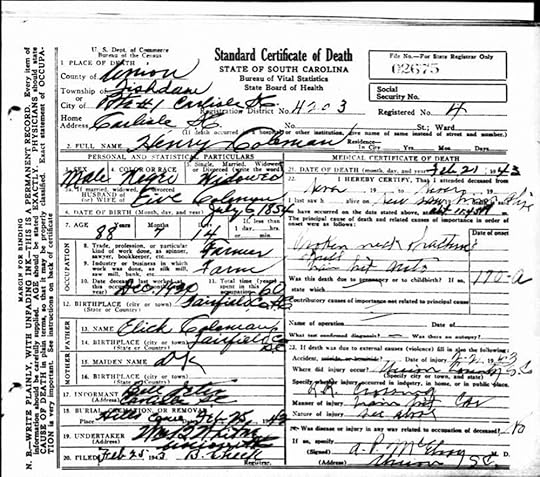
It is important to record and compare these records. I hope you can see how valuable it is to have all the enslaved's narratives at your disposal. Stay tuned because I will continue to show you how to find historical records from the enslaved's narratives. If you need assistance, just email me: robinfoster@genealogyjustask.com
July 26, 2023
Family Trees are Not Historical Records

Common Genealogy Just Ask Question:
Question:
“I just started my family history, and everything I found was wrong. What do I do?”
Answer:
Are you looking at the family tree?
You can find historical records at Research Wiki.
Go to Research Wiki, and look up county/parish, state.
It can be overwhelming to keep focused while searching online genealogical websites for historical records to document your ancestor. No, an online family tree is not a historical record, even though many beginners are preoccupied with family trees to identify ancestors. Trees can provide valuable hints, but the digitized versions of the original records on genealogical websites should be the real meat in your search. If you build your family tree without historical records, your family tree will not have reliable places, events, and dates. Your family tree will have about as much use as the limb on the previous page.
Keep the following tips foremost in mind, and the time you spend searching online will be well spent. Begin by building your online tree. Add what you already have and what your family can share with you with you: photos, documents, stories, etc.
Searching collections
Collections that are available on the website you choose for the area where your ancestor lived. You will become familiar with the different collections that exist in the time periods they cover, and you will plant those collections in the back of your mind as you anticipate which records will surface in a search. Often is more beneficial to search for an individual collection instead of searching an enormous host of records from the main page. Compare different collections from genealogical databases. A few popular websites are FamilySearch.org, Ancestry.com, MyHeritage.com, and FindMyPast.com.
Search for historical records from your ancestors record on the family tree. Most have the feature that allows you to search the historical records from an individual's record on the family tree. This is a wonderful way to filter out unnecessary results.
Attach records
Attach records that mention your ancestors to the tree that you are building. By attaching the records, you find you will improve the accuracy
of the records suggested and find documentation quickly.
As you discover historical records, be sure to attach them to the trees of other family members mentioned in a record. This will help you become familiar with parents, siblings, children, and spouses that you may not have known personally.
After discovering as much as you can for one ancestor, visit other websites that offer historical records. Create new sources for those records on the tree that you are building.
Consult other family trees last
Exhaust historical record collections online, begin to search for other sources attached to your ancestor on other online trees. Discover photos, stories or records that are not available online. More often than you realize, you will have the most documentation cited. After you have exhausted your search, consulting other trees will ensure that you will never be confused by conflicting details from another tree. Share the URL for each record that you complete. Be sure to share the places you find your family whether it be Facebook or e-mail.
Research your ancestor’s entire family in the way described above before going on to research their parents. Sometimes it takes getting to know an entire family group through available documents before you can discover more about the preceding generation.
Check website updates and new collections regularly. Once you exhaust records available and online databases then learn about resources in archives and local repositories by visiting the Research Wiki or Ancestry’s Wiki.
Avoiding the weak limb on a family tree

The most popular database on Ancestry.com is a public member tree with voluminous records. That is enough to make one concerned about the value of a member tree. Finding another person's family tree is like a child being let loose in a candy store to those new to research. The more seasoned researcher knows this: A family tree with no sources is like a diet with only sugar and no substance to sustain life. Therefore, a family tree with no sources ought to have a flashing red sign: “Researcher Beware.”
Trees with no sources

Finding trees is relatively easier than taking the extra effort to dig deeper or order a resource that is not online. It may even be thrilling to find someone else that has your ancestor on a tree, but what good is finding your ancestor on a tree with no proof of family relationship? Taking unproven information into your tree is like scooting out on the weakest limb.
It does not take much time to assuming ancestors and using undocumented trees, but you are sure to reach the end of the line ancestor somewhere. When there is no tree to document the next generation, people usually are forced to consult historical records. This is when the limb breaks because nothing jives in the records. That leaves you forced to start over with what you can document, and that has more validity.
Use documentation
Brick walls do not just show up in your path. Instead, you build them around your ancestor by following undocumented paths. If you have climbed your tree a few generations back without solid sources, you risk placing the wrong ancestor in the tree and wasting a lot of time.
Here is an example of research results achieved using documentation:
The oral history that you can gather can be vital in providing clues to help you document your ancestors. Of course, you should make every attempt to prove the information you are given and not to accept it verbatim. This is one case where the family oral history left out an ancestor and it was discovered using a unique record.
Same names

Naming patterns in a family can make it very difficult to distinguish one ancestor from another, and you must rely heavily on historical information. You do not know beforehand many times if enough resources exist.
The Tucker descendants were under the impression that the father of George Epps Tucker (1859 – 1927) of Carlisle, Union County, South Carolina was James Anderson Tucker (1801 -1885). At the time, I was relatively new.
Proving oral history
The 1880 Census you find George Epps Tucker, 21, in the household with James Anderson Tucker, a 78-year-old widower. The US Census does not provide the relationships to the head of household. Also, living there was George B. Tucker who was the brother of James.
Identifying other record types
Whenever there is a question as to who the father is, I know it could be answered by searching for a historical record. It was necessary to identify other record types that could shed more light. A visit to the South Carolina Department of Archives and History and a search among the probate index for Union County led to a reference to James A. Tucker. The record that opened the door to future information turned out to be the guardianship request by James A. Tucker for the son of George A. Tucker, dated 1871.
James A. Tucker requested guardianship of George Epps Tucker. This is the same George found living with him in 1880. George's parents were George A. and Annie Tucker. After the death of George, Annie Tucker had married William F. Holmes.

James A. Tucker was the grandfather of George Epps Tucker. A lot more details were gleaned from using this record than from relying on what my family had come to believe.
July 19, 2023
Forgotten Patriots Book
 Forgotten Patriots – African American and American Indian Patriots in the Revolutionary War: A Guide to Service, Sources, and Studies
Forgotten Patriots – African American and American Indian Patriots in the Revolutionary War: A Guide to Service, Sources, and StudiesI was recently made aware that a book by the ,DAR of "6,600 names of African Americans and American Indians who contributed to American Independence." It is available as a free download with 845 pages. It was updated as another "supplement to this book including additional names and documentation and can be downloaded for free."
That is two free pdfs. You can download them here: Forgotten Patriots Book
Say thank you to Elizabeth Gay. She was at SCGS Summer Workshop. She is the Executive Director of The Huguenot Society of South Carolina.
July 13, 2023
Creating Discussions Not Disputes Over Family Trees

If you have conducted research for a certain amount of time, you, no doubt, have stumbled upon an online tree that is less than perfectly accurate. At first glance, you may notice that a major detail about your ancestor is incorrect. You start to feel anger and frustration, and your first reaction is to go on with the attack. Wait. Stop, and take a deep breath. Consider other options that will help you correct information and keep a proper perspective.
First, call to mind the beginning stages of your own research. Did you ever discover a mistake that you later found and corrected? How did you feel? Would you say that you were intentionally being careless, or were your motives to deceive someone? Perhaps as you discovered future details or learned more about how to become more accurate in your research and documenting you gained more insight into your ancestor. With this perspective about your own process of learning to do family history, you can come to a better conclusion as to how this newfound researcher could have fallen into making similar mistakes.
Everyone researching on their own without collaborating with other people, either researching from the same family or in the same location has the potential to make errors in their findings. As online technology makes it possible for these researchers to discover and connect with one another, they will see discrepancies in their independent research. The solution should not involve shining a beam to expose the other person’s perceived errors, but researchers should begin a healthy, nonthreatening, objective discussion about the conclusions and documents that were used to reach those conclusions.
FamilySearch has an excellent feature on each individual that provides a space for researchers to begin these healthy discussions. On Otis Edna Tucker Vance (1905 – 1996) KVLX-RJV, there is an example of a discussion:

Otis Edna Tucker Vance (1905 – 1996) KVLX-RJV
You put forward lots of effort to gather the research that you have but putting the feelings of possessiveness about your own research aside, you are documenting part of the human family.
Those extended family that you find researching are descendants of your ancestor too. Honor that connection and share how the document proves one fact or another. If your research is incomplete and you have no record to document data you have recorded, do not defend your work in this case. Accept constructive feedback, and vow to do better.

Genealogy can only become more rewarding and accurate with your diligence in having healthy collaborations with other people who have more information on collateral lines, more documentation, and more recorded memories to share with you. It is conceivable in many cases how the descendant who is more closely related to the ancestor in question may have more accurate details. Work to keep from having riffs with these extended family members.
Here are some discussion openers that are not offensive:
"Hello, I am so excited to find another person who descends from ________. It is so hard to find records. How did you go about finding his mother's name?"
"I have been researching __________ for a long time. Can you share how you were able to find that will?”
If you discover the researcher has a gross error:
“Hi, I am so happy to connect with someone researching _________________. It is so hard to find records. I noticed that you have a different birth date. I found his birth record here: ____________. I hope this is of some help to you. Please let me know if there is another record that you are having trouble finding for _____________. I would be glad to share."
If you come to the point where it is difficult to resolve the issue, gracefully bow out. Do not dispute or offend. Make sure that your family tree has the correct documentation. The next person that comes along will discover it, and they will be grateful for your efforts.
Newcomer vs. veteran researcher experience
Sometimes it is difficult for those who did the painstaking research that was required long ago to make the transition in helping today's new historian who has grown acquainted with available resources and technology, allowing for quicker access, and finding documentation. It takes newcomers a little longer to appreciate the challenge of once having to travel far away to the place records were held. Many who have no idea at one time you had to order microfilm and wait a couple of weeks to view it.
The newbie’s enthusiasm for the swiftness of finding records online is contagious while at the same time the season veteran can instinctively know where to look when the answer cannot be found online.
At Genealogy Just Ask, we love it when we get newbies. As a matter of fact, we were thinking of them when we first started on Facebook in 2014. We try to see things from the newbies’ point of view.
This will be the seventh year for Genealogy Just Ask, and we are proud of all our members who joined us as newbies. They research right along with our seasoned researchers. I am happy to see their growth.
July 6, 2023
Protocol When Asking Your Questions at Genealogy Just Ask

Genealogy! Just Ask! is a strict genealogy group. We work to make sure that we keep our communications about research. We only ask questions or answer them. Join hundreds of people just like you who are finding their ancestors.
Would you like to ask questions or answer? We have several groups that are about discovering your family history. The groups can be found by going to Genealogy Just Ask Facebook Groups: www.genealogyjustask.com/home.
Genealogy! Just Ask! is one of the fastest growing genealogy groups. Each day you can find assistance with your research problems or offer your expertise to someone who is stuck.
Members helping:
· Understand the member’s question.
· Where have you looked?
· Be respectful or pass up the question.
· When helping, please be courteous. Many of our members are just beginning.
Members asking questions:
· Only ask one question at a time.
· Do not be too wordy.
· Ask your question on your own thread.
The purpose of this group is to assist members in researching ancestors and to learn about resources and techniques that will enhance that research. Our basic rules are (please read the full rules when joining):
1. No searching for or discussing living people
2. No selling goods or services (even if genealogy related)
3. Venting is discouraged.
4. Do not post your photos in this group.
5. Do not post downloaded newspaper images from subscription
sites. Post the URL/link instead. All downloaded newspaper
articles can get you blocked.
6. Use Find A Grave instead of the abbreviation. We do not want
to use any abbreviation that might be mistaken to mean
something outside of Find A Grave.
7. Please do not capitalize any part of your post. Capitalization
can make a member feel you have become angry or upset or
frustrated.
8. We cannot share familysearch.org as a member with LDS Access.
Understanding overcomes offenses in genealogy
We research our own ancestors and strive to learn about techniques and resources at our disposal. Everyone has started a unique way of learning as they go. If you have been involved for any length of time, you are probably aware of the topics that can get people a little hot under the collar. Views expressed can be taken without either party meaning for that to happen. People who do not understand become offended when someone points out an error or shares tips about technology, records, or best practices. Here are three challenges we commonly see:
Basing research on family trees without sources
Online family trees are the most popular accessed resources that people use in genealogy research today. However, that might make you cringe when you consider the fact that most trees are unsourced. Often, unseasoned researchers copy information from an existing tree or create sources with no proof of how they are related to the individual they add. What does the source consist of exactly? Here is an example of a source:________________________________________________________________________________________________________________________
Ancestry.com. 1910 United States Federal Census [database on-line]. Lehi, UT, USA: Ancestry.com Operations Inc, 2006.Original data: Thirteenth Census of the United States, 1910 (NARA microfilm publication T624, 1,178 rolls). Records of the Bureau of the Census, Record Group 29. National Archives, Washington, D.C. For details on the contents of the film numbers, visit the following NARA web page: NARA.
________________________________________________________________________________________________________________________
This example cites a source from ancestry.com. The record used came from the 1910 census:

Ancestry.com. 1910 United States Federal Census [database on-line]. Lehi, UT, USA: Ancestry.com Operations Inc, 2006. Original data: Thirteenth Census of the United States, 1910 (NARA microfilm publication T624, 1,178 rolls). Records of the Bureau of the Census, Record Group 29. National Archives, Washington, D.C. For details on the contents of the film numbers, visit the following NARA web page: NARA.
If you posted the image without the source, your family might not know how to find where you found the record. Let us say you are no longer around, and that descendant finds out a neighbor was related. Having the source there would be a significant help.
Using other people’s photos without permission
Of contention occurs as people download photos and share them online or in their publications without the owner’s permission. This leaves resentful feelings, and you need written permission for photos that you wish to use.
Remember, it can be against a company's copyright policy when you download, print, or share photos.

We will continue with, "Protocol When Asking Your Questions at Genealogy Just Ask," in our next blog post.
June 30, 2023
Tracing Family History Made Easy: Unveil Your Ancestors' Journey through Timelines
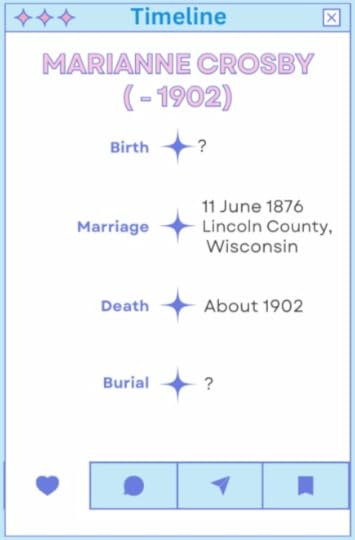
Fictitious Marianne Crosby ( - 1902)
We stress having a timeline. The purpose of a timeline is that it gives dates and places of events. This is what you have when you start filing the basics. Genealogy Just Ask will assist you. In the case of Marianne Crosby ( - 1902), you do not know her birthplace or birthdate.
Start with the marriage date and the county and state. You will find her birthdate on the Research Wiki.
Marriage
1836-1911 Wisconsin, County Marriages, 1836-1911 at FamilySearch — index - How to Use this Collection 1836-1930 Wisconsin, Marriages, 1836-1930 at FamilySearch — index - How to Use this Collection Pre-1907 Pre-1907 Wisconsin Vital Records Index at Wisconsin Historical Society - free index, images ($) 1973-1997 Wisconsin, Marriage Index, 1973-1997 at FamilySearch — index - How to Use this Collection 1973-1997 Wisconsin Marriages, 1973-1997 at Ancestry — index/images $ Pre-1907 Marriage Records, Lincoln County, Index WIGenWeb ProjectIf she died in Lincoln County, Wisconsin, look for her death date by going to Research Wiki:
Death
1820-1907 Wisconsin, Death Index, 1820-1907 at FamilySearch — index - How to Use this Collection 1835-1968 Wisconsin, Deaths and Burials, 1835-1968 at FamilySearch — index - How to Use this Collection 1867-1907 Wisconsin, Death Records, 1867-1907 at FamilySearch — index - How to Use this Collection Pre-1907 Pre-1907 Wisconsin Vital Records Index at Wisconsin Historical Society - free index, images ($) 1959-1997 Wisconsin, Death Index, 1959-1997 at FamilySearch — index - How to Use this Collection Pre-1907 Death Records, Lincoln County, Index WIGenWeb ProjectPlus, we have found one that goes way past the minimum. It is at HistoryLines.com. You share your familysearch.org or ancestry.com account, and HistoryLines.com makes the timeline for you. You can also add events to your timeline. Even historical events are added. This excites us.
This is my third great grandfather, David Nelms (1806 - ) from Anson County, North Carolina. He was on the Underground Railroad, and he went to Branch County, Michigan.

I hope you can tell that timelines help you so much.
June 20, 2023
Have These Three Things and Get Genealogy Assistance

To get assistance at Genealogy Just Ask Groups, we ask that you know three things:
· the name of your ancestor
· location
· time period
First, it is important that you have a name even if you do not know who the father or mother was. You should always search for the child of the father or mother, so you should always have a name (Genealogy Just Ask Facebook Groups).
The problem comes when the name has been altered by the indexer, census taker, or just changed over time with different variations. Make sure that you record the different names for whoever takes over. This will save them from having to do the work over again. When you must ask for assistance, this name can be beneficial. Second, we tell the members of Genealogy Just Ask, LLC that the quest for documentation is determined by location. To find your person it is much easier to have an exact location.
Beginning the search to identify and document your ancestors can be frustrating if you do not know where to look for records. Many family historians want to experience the joy of the hunt themselves. As a result, some begin searching online databases for the records they can easily find. Here we will help lead you to discover more resources in the locality where your ancestor lived.
What do you want to learn?
Knowing precisely what you want to learn about your ancestor will help guide you to the types of records that will answer your question. You will want to avoid the endless searching where you turn up everything except the details that you set out to find in the first place.
There is a certain thrill when you find your ancestor on an online tree and connect to a living descendant, and you may find important clues. Therefore, it is essential to compare notes with others who are researching the same person. It is especially rewarding if they can share or point you to the actual historical documentation that they used to draw their conclusions.
When you first start researching, you will be looking to document basic details about birth, marriage, and death of ancestors closest to you such as a person, a parent or grandparent. It will save you a great deal of time and energy if you know exactly where these events took place. In some cases, you will be able to access these records online, so you determine how to find access to vital records.
This is how you access the Research Wiki:
· To search the Research Wiki, go to familysearch.org.
· Look for Search at top after Family Tree.
· Click Search. The Research Wiki is at the bottom of the list.
· Select Research Wiki.
Then, you are at the Research Wiki:
Research Wiki
If you were looking for North Carolina Births, Marriage, or Deaths, search for “North Carolina Vital Records.”
North Carolina Vital Records at Research Wiki.
Records vary according to:
· period of time you are researching
· type of vital record (birth, marriage, death, etc.)
· place to access the record

How do you learn about records in a locality?
You will also need to research the records available in the area. The Research Wiki is a helpful resource to use here too. Search the county or parish and state to discover records in the area. Search Cyndi’s List to find more.
If you want to discover more. Study the holdings of the local archives to see if they list the record collection online or offer a publication that you can purchase. Also, the local library may have a collection on site or online for researchers. Finally, review the library's website for links to the history or genealogy.
For example, Buncombe County, North Carolina Libraries website lists genealogy resources under the link, NC Collection (Pack Library). One thousand images are available online with more coming (oral histories, newspapers, genealogies and more).
Make a list
While you are keeping in mind that you want to learn, make a list. Keep a record of the places where you find the documentation because you may discover more later in those same places.
Be sure to ask for suggestions of other places that you may try. Local librarians and archives are experts about the historical documentation that survives in their areas and where to access those records. If you learn of resources that are not listed on the Research Wiki or Cyndi’s List, be sure to contribute what you learn to make it easier for the next person who comes along.
Subscribe to get the third one of genealogy assistance.
June 13, 2023
How to Successfully Conduct a Genealogy Interview

This came from "My Best Genealogy Tips: Quick Keys to Research Ancestry, Book 2" on Robin R. Foster - Books2Read. Are you overwhelmed with the idea of preparing to interview your relative or ancestor? We will help you identify the things that will ensure a successful interview. You may already know bits and pieces of family folklore. You should Identify members of your family who can recall stories and details about your ancestors. Remember that information given to you should be verified by using historical documentation (Research Wiki) of if possible. Memories fade over time, and sometimes parts of the story are withheld or forgotten (Memories).
Before the interview
Set the appointment ahead of time and be prompt. Decide to spend no longer than the time that is comfortable for your relative. Decide the method you would use to record the interview:
Zoom Video camera Skype PhoneYou will need to select the best method that is most comfortable for you and your relative. Then, test the technology ahead of time to make sure everything works properly. Do not neglect to leave your story for your future generations as well.
Before your visit, ask your relatives to gather their families’ photos and make a list of family heirlooms. Also, ask for permission to take photos of these items with a mobile device or a digital camera.

Find out how many heirlooms were acquired. Before you begin the interview, you will need to draft a set of questions to help you find answers that lead to resources. Take another look at the blank spaces on your family tree and on your family group record for clues to what you should ask. What questions will best bring out these details? Ask for more information about your ancestors that will help you learn:
birth order of siblings and children spouse’s names places where your ancestor may have livedFind out who your relative remembers seeing as a child and people that they would go to visit. Also, ask about family members, the old homestead, churches, and schools your family attended.
During the interview
At the start of the interview, record your name, the date, the interviewee’s name and residence. Sometimes when you interview someone, it takes a little while to warm up and remember the past. Try not to startle them with your enthusiasm and meet them in a place where they feel comfortable opening up to you.
Ask for permission to share the recording with other family members. Your composure is essential too. Sit attentively and allow your interviewees to finish telling his or her story without being rushed to get to the next question. If the interviewee mentions people or situations you did not know before, do not interrupt. Instead, jot down the questions that you have, and ask for clarification after they finish talking.
After the interview
Allow the opportunity for your relative to share information that he or she did not have a chance to share. Ask for questions of other family members to interview and the questions that would be best to ask them. Take the time to transcribe the interview.
Put a hard copy with your research notes so that you can refer to it easily. Hopefully, you now have enough information to have more research success. Use the knowledge you gained to locate your family on the census. Find birth, marriage, and death records from the details you were given.
Visit the family cemetery to locate graves for family members. This applies not only to ancestors, but to your extended family as well. You will not be able to predict who will lead you to discover more about your family.
Anything that you get while doing oral history interviews can be used to prove or disprove whether you have got the right historical record. You also must be advised that your oral history must be proven if it is accurate because inaccurate details can lead you down a rabbit hole.
June 8, 2023
Genealogy Hotspots for Genealogy Just Ask, LLC in June and July 2023
That's right! Genealogy Just Ask, LLC will be at Charlotte Hawkins Brown Museum State Historic Site in Gibsonville, North Carolina, for Black Heritage Day on June 10, 2023. Fun for the whole family. See what they have planned for you: click here. Stop and say hi to me at my tent where I will sell my books.
"Dr. Charlotte Hawkins Brown was born on June 11, 1883, in Henderson, NC. One of the many skills Charlotte’s mother passed down to her was the ability to play the piano. Throughout her life Charlotte would turn to music and art to express herself, to fundraise, to celebrate, and to teach students.
In a short autobiography written around 1927, Dr. Brown writes about her “insatiable thirst for art…” We’ve decided to take this opportunity, her 140th birthday, to celebrate that thirst and share art in its many forms with our community. Black Heritage Day was conceived as a celebration of Black life, history, culture, food, and so much more. This year we’re working with the Greensboro Opera, hence the Afro-Classical Celebration. Our headline musician is the enormously talented Chrystal E. Williams, alongside Felipe Hostins," Charlotte Hawkins Brown Museum State Historic Site.

Next, we be in Union, South Carolina for the UCCRP JUNETEENTH Remembrance and Celebration 2023 on June 17, 2023 from 4-8 pm. This will be a time for truth, memory, and reconciliation. Fun for the whole family. I will teach researching local family histories and family trees in the L.W. Long Community Resource Center.
Listen to Timika Wilson and Stephanie Cohen talk about the UCCRP JUNETEENTH Remembrance & Celebration:
Timika Wilson, Stephanie Cohen. UCCRP JUNETEENTH Remembrance & Celebration 2023. 6-6-23
Recorded live at WBCU RADIO "UNION COUNTY'S RADIO STATION.

To top it all off, we will be at The 2023 SCGS 50th Annual Summer Workshop- 2 Hybrid Events on July 7-8 to be held at the South Carolina Department of Archives and History (SCDAH) 8301 Parklane Road, Columbia, SC 2922. Find us at the booth.

